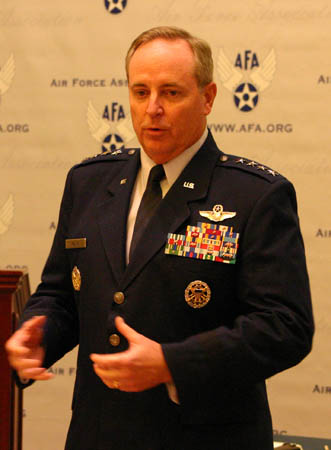
Sept. 19, 2013—During a press briefing at AFA’s Air & Space Conference in National Harbor, Md., on Sept. 18, Chief of Staff Gen. Mark Welsh offered a sobering assessment of how the nation’s continuing financial crisis will affect the Air Force after Oct. 1. What follows is an excerpt of those comments.
a press briefing at AFA’s Air & Space Conference in National Harbor, Md., on Sept. 18, Chief of Staff Gen. Mark Welsh offered a sobering assessment of how the nation’s continuing financial crisis will affect the Air Force after Oct. 1. What follows is an excerpt of those comments.
Question: All of your senior generals have been saying, “We are assuming the worst case; planning for the worst case.” Walk us through what happens Oct. 1. Are there any immediate effects, and what would happen over the next few months
Welsh: “It depends on what happens with the budget. . . . I’ll just give you what I assume will happen.
“I assume there will not be a budget deal done. I assume they [members of Congress] will address the debt ceiling, and I assume we’ll be under a continuing resolution.
“If that’s the case, the Air Force—I think it would be prudent, and I believe the [Defense] Secretary will—put spending guidance out, anticipating that we’ll be in a continuing resolution and likely going into sequester. We did the same thing last year. It as actually very helpful to us; it didn’t mitigate the entire effect, but allowed us to spread the impact over more than just the six months that we were actually sequestered. So I’m assuming we’ll do the same thing this year.
“If the CR is relatively short term, I don’t think there will be major damage to new-start programs planned in ’14. But within about three or four months of the beginning of the year, we will start to have readiness impacted in this fiscal year—in Fiscal Year ’14—just like it was in ’13. We anticipate we’d lose maybe 15 percent of our flying hours under this kind of budget situation, which means that we would look an awful lot like FY’13, in terms of what we did with squadrons. And we might adjust them a little bit differently, but we’re going to have squadrons sitting down, standing up; it’s going to happen again.
“We’re going to have to look at canceling exercises, canceling training programs, doing things like looking at weapons school classes, instructor upgrade programs; all the things that create the institutional expertise to do our job, which is fighting and winning the nation’s wars.
“So, we’re looking at having that cycle again in ’14. I don’t know that there’s any way to avoid it.”
Question: And so, the effects will begin a few weeks after
Welsh: “I would say three or four months after we start the new [fiscal] year. And I’m hoping the CR doesn’t last that long, if there is one. I am an optimist.”
